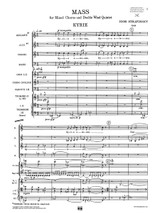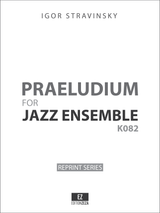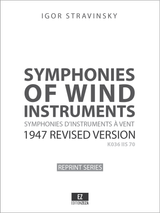
Igor Stravinsky composed his Mass between 1944 and 1948. This 19-minute setting of the Roman Catholic Mass exhibits the austere, Neoclassic, anti-Romantic aesthetic that characterizes his work from about 1923 to 1951. The Mass also represents one of only a handful of extant pieces by Stravinsky that was not commissioned. Part of the motivation behind its composition has been cited by Robert Craft and others as the product of a spiritual necessity, as Stravinsky intended the work to be used functionally.
"My Mass was partly provoked by some Masses of Mozart that I found at a secondhand store in Los Angeles in 1942 or 1943. As I played through these rococo-operatic sweets-of-sin, I knew I had to write a Mass of my own, but a real one."
— Igor Stravinsky to Robert Craft
The work is scored for mixed chorus and an ensemble of wind instruments comprising two oboes, English horn, two bassoons, two trumpets, and three trombones. There is also some minor solo material (often sung by members of the choir) in the second and fourth (Gloria and Sanctus) movements. Stravinsky specifies in the score that "children's voices should be employed" for both the soprano and alto parts, but, as with Stravinsky's Symphony of Psalms, concert performances of the Mass usually employ adult singers.
Stravinsky chose to compose this Roman Catholic Mass despite his own Orthodox faith. He stated that this was because:
“I wanted my Mass to be used liturgically, an outright impossibility as far as the Russian Church was concerned, as Orthodox tradition proscribes musical instruments in its services- and as I can endure unaccompanied singing in only the most harmonically primitive music.”
Stravinsky also said of the Credo:
“One composes a march to facilitate marching men, so with my Credo I hope to provide an aid to the text. The Credo is the longest movement. There is much to believe.”






